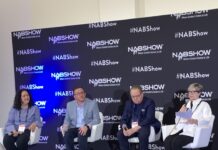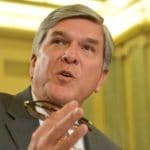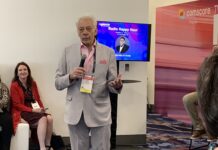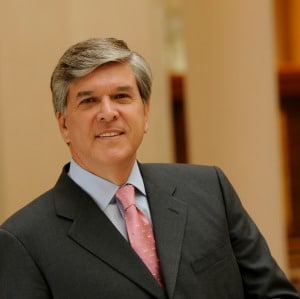
As Gordon Smith heads into his eighth year as president and CEO of the National Association of Broadcasters, many in our industry are glad that position carries no term limits for the former Senator. Smith is very popular among the NAB radio membership and his calmness, stability, and professionalism serve the radio industry very well (in addition to the great team he has working for him). Smith is among Radio Ink‘s 40 Most Powerful People in Radio and has been ever since he took the NAB leadership job eight years ago. His official ranking on the list will be revealed next week when our Top 40 issue mails next week.
There are quite a few important issues broadcasters have to deal with in Washington, which is why it’s nice to have the former Senator on the broadcast team, and why Smith sits at one of the 40 seats at radio’s power table. In anticipation of our 40 Most Powerful People in Radio issue, here is our extended interview with NAB CEO Gordon Smith.
Radio Ink: What are you most proud of about the NAB and the people there?
Gordon Smith: I continue to be proud of the advocacy work our team at NAB does defending the interests of local radio. There is no shortage of issues that affect the future of the broadcast radio industry, and I’m proud of our track record of success. We have made great strides on a number of public policy fronts. There are currently 191 Representatives and 22 Senators who support the Local Radio Freedom Act, which rejects the imposition of an onerous performance royalty on broadcast radio stations. We are currently soliciting other Members of Congress to show their support for the promotional value of radio by signing on to the resolution. The FCC is also moving forward with another window for FM translator applications for AM radio stations. FCC Chairman Ajit Pai has been a leader on AM revitalization ever since he got to the Commission. We will happily work with him to ensure the AM radio band has the resources necessary to thrive.
I also need to mention how proud I am of the broadcast industry in general for stepping up to address the heroin and prescription drug abuse epidemic that is ravaging our
communities. In September, NAB announced that it was teaming up with the Partnership for Drug-Free Kids on an ongoing campaign to raise awareness about this crisis and help those affected find the help they need. The response from our radio and television station members has been terrific. Stations have run partnership-produced PSAs, developed town halls and special news reports, and provided resources and community outreach. I hope our efforts are part of a larger effort to combat this scourge.
Radio Ink: Are you happy with where the radio industry is today, compared to all the other media competing for the consumers’ ears and the advertisers’ dollars? How can we improve our standing with both?
Gordon Smith: There is a misperception being promoted by some that broadcast radio’s influence has somehow been diminished. Advertisers sometimes lose sight of how powerful radio really is. Local radio is still the most popular place for listeners to discover new music. Every week, 262 million listeners tune into their hometown stations. Radio is a top medium for a return on advertisers’ investment. These are the facts that hardly get mentioned when the future of radio is discussed.
I’m a little surprised that political advertising hasn’t been more robust on radio. When I was running for political office and wanted to move the needle, I didn’t turn to cable TV or satellite radio. I went to my local radio and TV stations. Some of the consultants who handle advertising for politicians seem oblivious to this. Maybe the consultants are distracted by the shiniest, newest product. Whatever the case may be, we need to make those running for office understand that radio can turn out voters.
In terms of attracting consumers, while we remain the most-used form of media, we can’t rest on our laurels. We need to be available to listeners wherever and whenever they want. We need to continue innovating with streaming and services like NextRadio. We need to keep pushing Apple to activate radio chips on the iPhone so consumers can listen to their hometown radio stations without eating into their data plan.
Broadcast radio should also focus on maintaining its primacy in the car dashboard. Our competitors would love to supplant us as Americans’ top choice in the automobile. NAB has been working to ensure automakers continue appreciating the longtime relationship between the car and the radio listenership.
Radio Ink: What is the best way to tell radio’s story — beyond the 90 percent-plus numbers we always hear from Nielsen?
Gordon Smith: Broadcast radio is unmatched when it comes to one element that no other audio medium can offer – a real connection to local communities. We have built our businesses on the idea of localism. We have presence in every community across the country. What better platform is there to tell our story?
We must be active in our local communities. That means keeping listeners informed when a storm is barreling down on your town. It’s serving as a community gathering place after the storm has passed, or being a sounding board on important local issues. It means supporting local charities and causes in any way you can.
There is no shortage of ways radio stations can demonstrate their localism. But localism must remain central to our mission. That’s our franchise, and ours alone.
Radio Ink: What can everyone reading this issue do to better advance the industry?
Gordon Smith: I try to make this point whenever I speak to broadcasters. NAB does a terrific job of representing the broadcast industry in Washington and advocating on our members’ behalf. Yet, we can’t match the power of local radio and TV stations developing relationships with their members of Congress. Don’t ever underestimate the importance Members of Congress place on their local broadcasters. You live and work in their communities. You create well-paying jobs. You own the megaphone that allows them to reach their constituents. Get to know your Senators and House members, and use that megaphone to help advance your interests.
When I served in the Senate, I would meet with trade associations such as NAB and appreciate the arguments they made on behalf of their members. But when my Oregon broadcasters came into my office, I knew what issues were important to their day-to-day operations and would weigh that carefully when deciding how to vote on a bill.
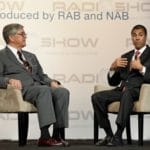
We also have an FCC Chairman who proactively reaches out to broadcasters and wants to have a dialogue. That is a welcome change. We should take advantage of that and let Chairman Pai – and the rest of the FCC – know where we stand on the issues.
Radio Ink‘s 40 Most Powerful People in Radio issue is out on July 24. In addition to our most popular list, the 2017 issue includes an interview with our Lifetime Leadership recipient Bruce Reese, Radio’s Top 40 Advertisers, Radio’s Top 40 Revenue-Producing Companies, who’s made our Top 40 list the most times, a killer radio success story, all of our regular columns and much more.
To subscribe to Radio Ink in time to receive our 40 Most Powerful People in Radio issue, downloaded directly to your device, GO HERE.
